Paul Alonzo Manzano
Editor’s Note: Many on The Fil-Am Voice’s staff have connections to Sakadas and the plantations. Although we generally hate to be the subject of the articles / columns, this is the seventh in a series focusing on The Fil-Am Voice’s staff’s Sakada offsprings.
Lucy Peros | All photos courtesy Paul Manzano
The love he has for his Dad, a Sakada, is very eminent with this Sakada Offspring’s life. Paul Alonzo Manzano is the Fil-Am Voice Distribution Manager. He is currently employed as a Parks Maintenance Supervisor—Coastal with the County of Maui Department of Parks and Recreation. For about the last fifteen years, Paul has also owned and operated PM Handyworks, specializing in garage doors and handyman work.
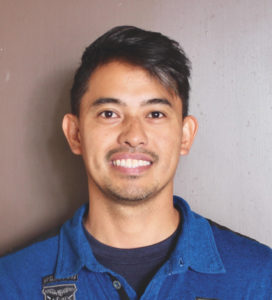
Paul was born in Wahiawā, O‘ahu on August 30, 1982. He has four siblings, Edwardo Manzano (deceased), Maylene (Robert) Manzano Serna, Francisca Manzano Elegino and Prudencio Manzano. Paul has a daughter, Angeline Joy Islao Manzano and a granddaughter, Ava Rose Islao.
Growing up on the North Shore of O‘ahu, living in a household that spoke mostly Ilokano, and attending school with dominantly whites and Polynesian students was quite an experience for Paul. He claims he never felt misplaced but was accepted by his peers. Even in his high school years, Paul claims his experience was very memorable despite some additional challenges. Although it was difficult growing up without parents, his friends surrounded him with love and support. Paul enjoyed playing basketball, going to the beach or just spending a relaxing quality time with his friends and family.
Paul has an Associate in Arts degree in Liberal Arts. He is presently working on his Bachelor of Arts degree in Public Administration from the University of Hawai‘i West O‘ahu.
In May 2005, Paul joined the State of Hawai‘i Department of Transportation, leaving a position in the private sector (construction industry) for the stability of government work. He met a lot of people at the State Department of Transportation and experienced and learned a lot of things such as how to drive a Cushman with a left-hand manual transmission or how to reverse park a giant mower. The Department of Transportation gave him the opportunity to change base yards a couple of times—Kalaeloa Airport and Dillingham Airfield. It also gave him the opportunity to move to Maui in 2010, taking a permanent position at Kapalua Airport. He fell in love with Maui. Paul also met the love of his life, Dulce Karen Butay on Maui in 2011 and they have been together ever since.
In 2013, Paul transferred to the County of Maui Department of Parks and Recreation. He claims that working for the County is not easy. He says one must be selfless because one will be overworked and underpaid. Paul also says one must have thick skin because the public and your fellow co-workers will purge you of all your hard-earned stripes. “But at the end of the day, you walk away knowing that you serve your community to the best of your ability, even if no one appreciates anything you do. And if you can walk away happy with a positive mindset, you have earned something no one can take away and that is your unshakable will and unwavering fortitude.”
Paul got very emotional when sharing about his Dad who was a 1946 Sakada. “It’s awfully difficult for me,” Paul explained. “My Dad passed away in February 1994 when I was eleven years old. Throughout all the years, all my pain and suffering from growing up without his presence and my Mom’s presence (who died in April 1994), was properly controlled and put neatly under the bed for safekeeping never to be spoken of, ever. Until now. This really has taken a whole new dimension because even to this day, tapping into these memories cuts very deep. All I have are stories to recall from a three to seven-year old kid’s memory bank which is where the stories from my Dad comes from. Each night, my Dad would tell me stories as we lay in bed because he wouldn’t sleep until I closed my eyes first.”
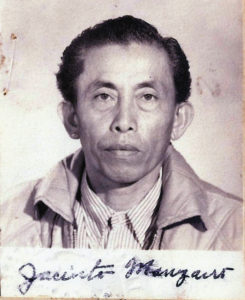
Jacinto Yenigo (Inigo) Manzano was one of fourteen children born to Agapito and Cornelia Inigo Manzano: Euforcino, Ignacio, Sergio, Marciano, Ponciano, Florencio, Consuela, Carlina, Margarita, Alejandra, Felipa, Asuncion, and Felicima.
Jacinto was born on March 25, 1920 in Bugnay, Candon, Ilocos Sur. “My Dad told me his life in the Philippines was difficult,” recalls Paul. “There were fourteen children and his Dad (Agapito) was always drunk. My Dad painted a picture of extreme poverty. He dropped out of Bugnay Elementary School in Candon, Ilocos Sur very early, receiving only a third-grade education. He spent most of his childhood stealing from the market and bringing food home to share with his siblings. He only wore one slipper and his underwear. Later he joined the military. My Dad was one of those Bolo Men in the Philippines. He told me stories of his best friend getting shot and seeing him die in front of his eyes. This used to make him tear every time. He also had a strong dislike for Koreans. My Dad would tell me stories of working with the Americans and how they used to trade rations because he was not so fond of bread.”
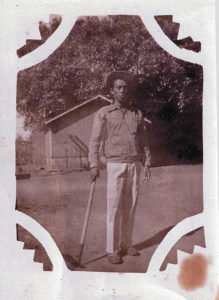
Jacinto married Rosario Cesaria Marcelo and they had two children: Francisca born in 1941 and Prudencio born in 1943.
After World War II, Jacinto came to Hawai‘i on January 14, 1946 on board the SS Maunawili from Port Salomague, Cabugao, Ilocos Sur, Philippines. Paul remembers the stories his Dad told him about the trip. “My Dad said the month-long boat ride was torture. Many people got sick and had no food. Through some research, I found the manifest of Sakada immigrant arrivals. It looks like my Dad landed in Hilo, Hawai‘i on January 30, 1946 and went on to Kahului, Maui on February 1, which makes sense per a conversation that he spent some time working on Lāna‘i on the sugar plantation.”
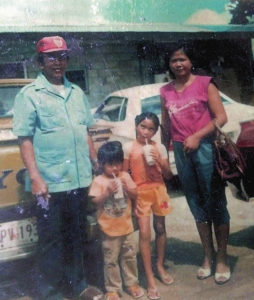
Later, Jacinto petitioned for Rosario and his two children to join him but Rosario did not want to come to Hawai‘i and unfortunately, their marriage did not work out.
Eventually, Jacinto returned to the Philippines and went to Laoag City, Ilocos Norte, where he married Angelita Corpuz Alonzo. Their first child, Edwardo died in the Philippines due to medical complications. Angelita moved to Hawai‘i and they lived in Whitmore Village where Paul’s dad retired from Dole Plantation. While working at Dole Plantation, Jacinto acquired skills as an accomplished carpenter and built homes in Wahiawā that are now the “old” side of Whitmore.
“My parents had a hard time conceiving so they adopted my sister Maylene from my uncle Elviro Alonzo,” recalls Paul. “I was born soon after. One of my Dad’s stories is he didn’t want me growing up in Wahiawā which was known to be a trouble spot, so he moved our family to the North Shore on O‘ahu, where he built our home in Hale‘iwa.” Both Maylene and Paul attended Sunset Beach Elementary and Kahuku High & Intermediate School.
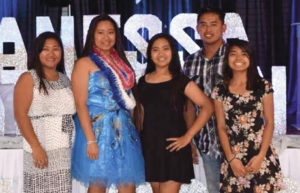
According to Paul, his Dad was and still is his superhero. “Everyone can attest that I was a Mama’s boy,” Paul says with a laugh. “Yeah, I was spoiled, sheltered by my Mom and Grandma but I will tell you that I was truly my Daddy’s boy. People said my Dad was very intimidating but I never saw that side. I was able to see the side of him that no one else saw. He was strong but still compassionate. He was rough but gave big hugs. He would do anything and everything for his family and he loved us dearly.”
Paul explains how close he was to his Dad. “We ate together, we would bathe together, we slept in the same bed, he even took me to get haircuts at his barber. He took me everywhere. I remember my first chicken fight and he put me on his shoulders to see. I remember my first pig that he let me kill on the back of his truck. I remember watching him sew fishing nets, disassemble guns, cleaning and putting them back together. We would go to the pineapple fields and pick a truckload of pineapples. He would bring us to the Swap meet every weekend. He would husk coconuts and I would scrape them for eating using the paggadgad. He showed me and my sister Maylene how to build and we would watch Hulk Hogan on WWF late Monday. We used to talk for hours on end.”
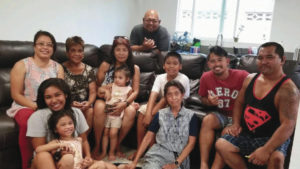
During one of those conversations, Paul would learn from his Dad the Filipinos and Japanese workers were constantly fighting. “In our room, my Dad hung a yellow bag full of dimes, always full and always just out of my reach. I asked him to take it down and he emptied the contents on the table. Millions of dimes, at least it looked like a lot to me as a five-year old kid,” Paul recalls. “My Dad told me he used to get paid a dime a day, doing back-breaking work in the fields. He would tell me to always remember your hardships, they will make you strong.”
Jacinto also told Paul he would teach Paul how to box, how to do escrima, and how to cook lechon, etc. Jacinto even promised Paul he would take and show him the Philippines where he came from.
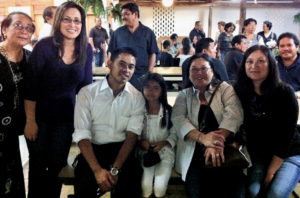
“As I got older, his health rapidly declined and those promises slowly went away and eventually vanished when he passed away. My Dad’s health started to decline sometime when I was seven or eight years old,” Paul says. “He suffered a stroke and was unable to walk on his own. He spent the next three years in a wheelchair and in bed. I remember I would still crawl onto his hospital bed and lay next to him just like so many times before. I think it was really hard for the whole family to see him in this state, knowing who he is and what he stood for in our family.”
Before he passed away in 1994, Paul’s Dad left very important and wise lessons to his children. Here are some of those lessons:
• Have good manners and present the right conduct always. It doesn’t matter how gwapong you are or how nice you make yourself, if your conduct is bad, you will always be ugly.
• Don’t mind what job you have or how much you get paid. Don’t just do it to get money but be the best at it. Even if you are a janitor, your toilets should be the cleanest.
• Do not count on anybody, some will let you down. You are a Manzano, so do not complain about it. Just figure out how to do it even if it means doing it by yourself.
• When you eat, make sure you earned your food. If you did not, it’s better if you don’t eat. In other words, don’t depend on public assistance or leech off others.
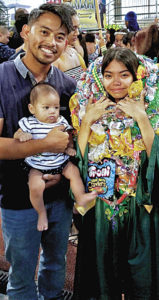
Paul wanted to end this story about his father with this ode he wrote:
My Dad, the father, grandfather, protector, man of strength and value. My Dad the Sakada that through his hardships, is the root for the entire family coming to America. My Dad, the superhero who could do anything. I’ve lived most of my life without him and had to fill the gaps on my own but his legacy lives on forever through the hearts of those he touched and the bloodline that runs through over thirty grandchildren and great grandchildren and via the last surviving heir who he left to continue to carry the Manzano banner to the best of his ability for the rest of his life. ‘Family, like branches on a tree, we all grow in different directions, yet our roots remain as one.’ Anonymous. We love you so much Dad.
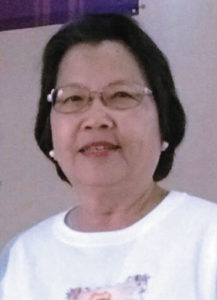 Lucy Peros is a retired teacher. She taught at St. Anthony Grade School and Waihe‘e Elementary School. Both her parents, Elpidio Cabalo (a 1946 Sakada) and Alejandra Cabalo of Hāli‘imaile worked for Maui Land and Pine Company. She is now enjoying retirement. She now has time to join the other seniors at the Enhance Fitness Program under the Department of Aging three times a week, attend the line dancing class and other activities at Kaunoa, and joins the other Waihe‘e School retirees when help is needed at the school. Lucy also devotes some of her time to activities at Christ The King Catholic Church. She enjoys writing and reading in her spare time.
Lucy Peros is a retired teacher. She taught at St. Anthony Grade School and Waihe‘e Elementary School. Both her parents, Elpidio Cabalo (a 1946 Sakada) and Alejandra Cabalo of Hāli‘imaile worked for Maui Land and Pine Company. She is now enjoying retirement. She now has time to join the other seniors at the Enhance Fitness Program under the Department of Aging three times a week, attend the line dancing class and other activities at Kaunoa, and joins the other Waihe‘e School retirees when help is needed at the school. Lucy also devotes some of her time to activities at Christ The King Catholic Church. She enjoys writing and reading in her spare time.
